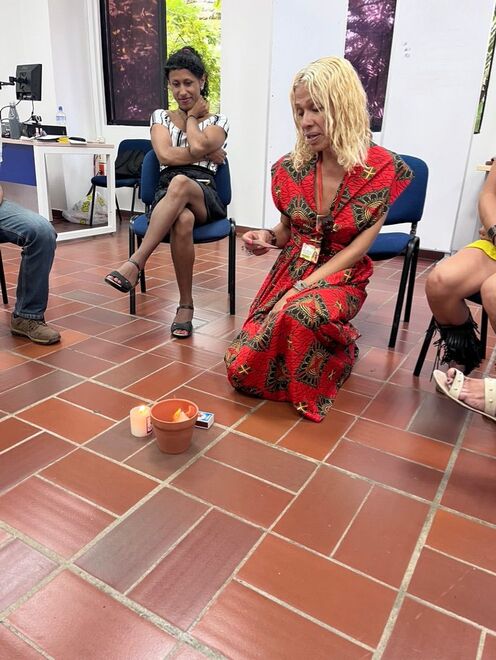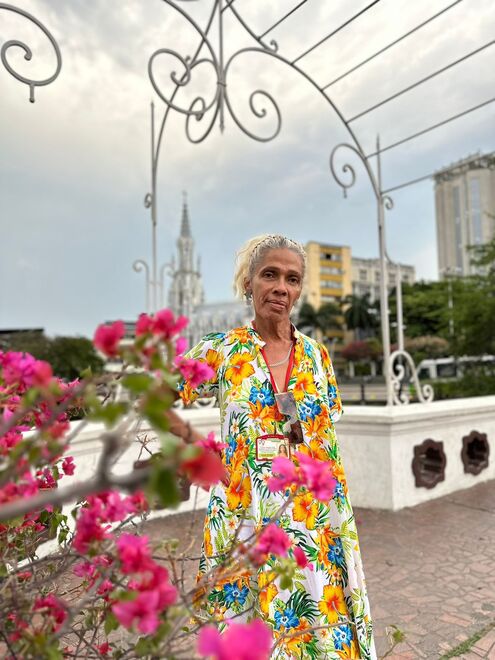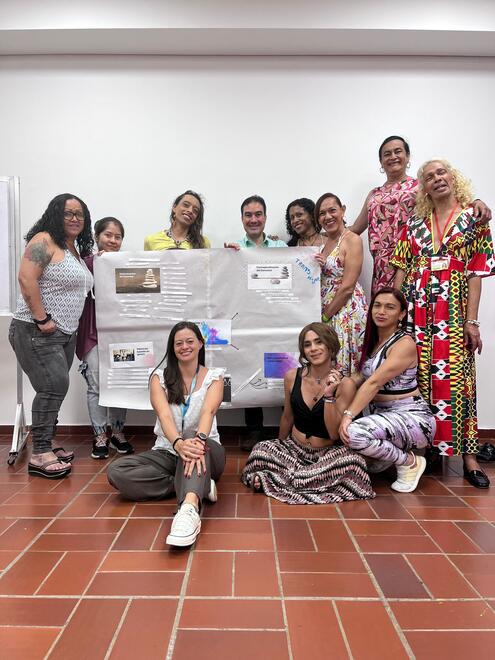TransMujer Association: The NGO that empowers self-care
Led by Pamela Montaño, Asociación TransMujer empowers self-care in Colombia by offering sex education and support to trans and cisgender women.


By Laura Reyes
Pamela Montaño, founder of the TransMujer Association, is transforming sexual education in Colombia. Unlike traditional approaches, such as classroom classes or awkward talks with parents, her nonprofit offers support and knowledge to both trans and cisgender people, especially those who work in the sex industry. Montaño and his team highlight the importance of receiving comprehensive sexual education from diverse and specialized sources, making a significant difference in the lives of many people.
The prevalence of sexually transmitted diseases (STDs) in Colombia is alarming; In the first months of 2023, 4,716 cases of HIV/AIDS were reported, and the Ministry of Health indicated that every ten hours a Colombian contracts an STD, such as herpes, syphilis or gonorrhea. Dr. Alexandra Caballero, a specialist in sexual medicine, highlights that sexual education from an early age is deficient, since, instead of promoting self-care and self-love, it is based on fear. This prevents a healthy and positive understanding of sexuality.
A Mother Figure in the Community
Pamela Montaño Díaz, a woman with a slim build, often affectionately described as a mother figure by some of the beneficiaries, dedicates her time to participating in colloquiums at the Javeriana University of Cali and to training and leadership on issues of sexual education and care. However, she did not always know that her vocation would be to lead in her community nor that her goal would be to become a kind of “mother” who educates, cares for, and even scolds her beneficiaries as if they were her children.

Pamela Montaño’s Struggle in Her Life
A victim of rejection and physical and psychological violence from her father, Pamela decided to flee at the age of 13, taking refuge in the house of a friend and her mother. In the 1980s, she worked on one of her dreams: to be a hairdresser and beautician. Unfortunately, his right hand was affected after a traffic accident, which prevented him from continuing with his work.
Pamela noticed stigmas around the LGBTQI+ community, especially towards trans people. Two of these stigmas were mistreatment by institutions such as the police and violence. For example, some were HIV positive, and criminal gangs attacked others because of their sexual identity. Despite this situation, they did not receive medical attention. This motivated her, at 33 years old, not only to articulate with other trans women but also to create an organization that would facilitate the self-care of trans and cisgender women who work in the sex industry.
The Birth of the TransMujer Association
Initially, Pamela did not receive wholehearted support from her friends in the sex industry. “They laughed at me and were only interested in making money. I managed to persuade them to sign the statutes, but they showed no interest beyond that.” Despite their reluctance, Pamela succeeded in getting her friends to sign the statutes, though their commitment to active involvement remained uncertain


With the support of an accountant, he registered with the Cali Chamber of Commerce. “I decided to name it Association because it is not a foundation, Association of Transvestites and Transsexuals: TransMujer,” he explains. She also adds that, despite having seen that cisgender women may have more complications due to the required exams, she decided to include them within the association. Finally, the association was consolidated in 2009.
The Revolution in the TransMujer Association
The beginning of this association brought difficulties of great magnitude, one of the main ones that Pamela encountered was violence. She says that when she began her process to train sex workers, she received threats from businesses specialized in this industry, as they feared that there would be a rebellion against them. “This made me hide for practically four months in the house of Jose Ignacio Urrego, he is an anthropologist and at the moment he is in Paris; I had to retire,” he says. It should be noted that this house ended up being the main headquarters of the association.
But when one door closes, another opens. This situation allowed her to meet more cisgender women to guide and educate them in sexual education. “When they got sick, I took them, even if they didn’t have social security. Over time, I gained the appreciation of them and the Ministry of Health and the department.”
What makes TransMujer a revolutionary association is the support it offers to trans and cisgender women, providing self-care workshops related to health and sexual education. Likewise, it breaks with inequitable patterns. “The work that Pame has done with the teams in which she has been has a very outstanding work in the prevention of transmission of sexually transmitted diseases HIV, syphilis, and hepatitis, among others. Their work is more educational, to generate information so that people who do sex work or with their partner understand and understand,” says Paula Hoyos, social worker of the association and Psychologist, Master in Family and doctor in psychology.
Self-Reliance and Key Partnerships
Thanks to Pamela’s work in Jamundí, the Ministry of Health donated more than 10,000 condoms and medical support. “We organized a health day in Cali and filled the auditorium with 250 women. The response was so great that we had to ask other organizations for help to fill out forms,” she says proudly.
In 2011, the Global Fund became interested in working with sex workers, and Pamela set up her foundation in her own home, donating more than 10 million Colombian pesos. Despite the violence in the region, this alliance was crucial.
In 2018, the TransMujer Association won a call from the Ministry of Sciences, in collaboration with the Javeriana University and the Trans Mujer Foundation. “We teamed up with three people from each institution and we won it,” says Paula.
Pamela highlights that the majority of the funds have come from her work as a sex worker and from the calls managed. He has stood out for his leadership and the passion with which he carries out his work or its ability to shine in educational and health institutions in Colombia.
An impact that marks lives
Pamela Montaño has helped more than 1,000 women through the TransMujer Association. Brenda Castaño, beneficiary of the foundation, shares: “It has been very important. They are always attentive to diseases and prevention. They know what can happen to us girls if we do not protect ourselves. We get told a lot ‘Get tested if you’re in this situation!’ “They give us a lot of support and follow-up so that we take the retrovirals.” Brenda also notes that Pamela taught her about self-love. For her part, Luisa Restrepo, a trans woman, highlights the benefits received from TransMujer, such as a million pesos and an urgent chair.
The impact of the TransMujer Association, led by Pamela Montaño, goes beyond numbers and statistics. Her work has transformed lives through comprehensive sexuality education and self-care, providing crucial support to trans and cisgender women in the sex industry.
Despite the challenges and adversities faced, the association has created a safe and empowering space, demonstrating how commitment and passion can generate significant changes. TransMujer’s story not only positively impacts its beneficiaries but also offers an inspiring model for confronting exclusion and building a more inclusive and healthy future.


If you can contribute your grain of sand, you can contact Pamela Montaño:
+57 318 8287132.


